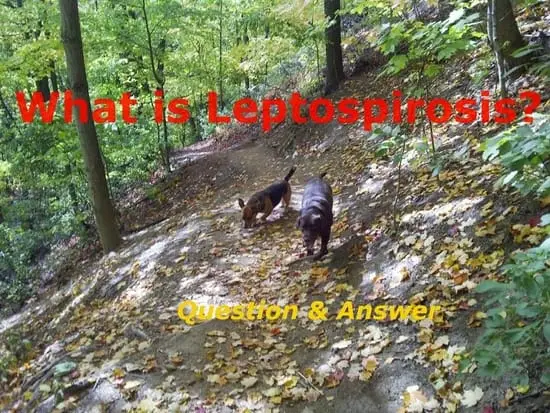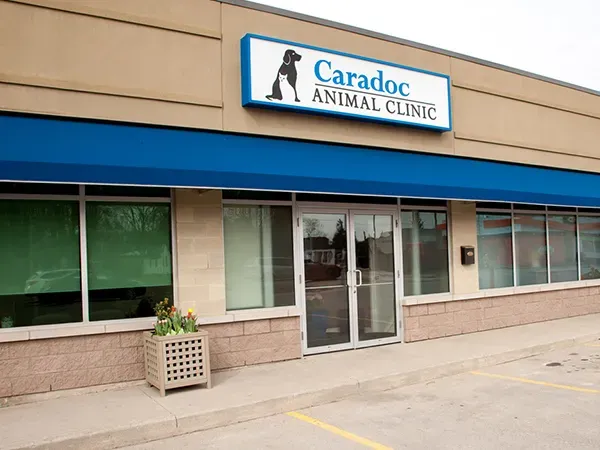Question & Answer: Caradoc Animal Clinic’s Discussion on Leptospirosis

Q: What is Leptospirosis?
A: Leptospirosis is a zoonotic bacterial infection, meaning it can be transmitted from animal to animal or human, more specifically in Ontario between wildlife (raccoons, skunks, etc.) to dogs 1. Cats tend not to be affected by Leptospirosis however there have been reported cases 2. Leptospirosis can be transmitted to humans, although currently, very rare in Ontario.
The optimal environment for the Leptospirosis bacteria is in slow-moving or still water at temperatures between 0-25⁰C. Leptospirosis lives in the kidney of the host and is passed along in urine into water4. Dogs contract this disease through water, which can either be through drinking infected water in puddles, ponds, etc., or the infected water entering open skin wounds1.
Q: What does Leptospirosis do?
A: This bacterial infection mainly affects liver and kidney organs. One of the liver’s main functions is to fight infection. One of the kidney’s main functions is to filter to blood and secrete unwanted compounds in the urine. Leptospirosis rapidly replicates in these organs, and consequently, inflammation occurs1. This can cause serious damage and may result in tissue necrosis (tissue death). This leads to organ failure. If left untreated, this disease can cause death.
Although the liver and kidney are the main targets, canine Leptospirosis patients can show many diverse symptoms such as respiratory distress, pancreatitis, bleeding tendencies, and many more1.
Q: How common is Leptospirosis in my area?
A: Leptospirosis is gaining momentum and is becoming more prevalent in rural and urban areas. There have been reported causes of Leptospirosis in city areas as well as smaller towns, especially in Ontario. Leptospirosis seems to have an increasing prevalence due to many factors such as increasing wildlife populations and more veterinarian awareness about the disease3.
Q: How can I prevent my dog from contracting Leptospirosis?
A: There is an annual canine vaccination for Leptospirosis, call the Caradoc Animal Clinic at (519) 245-1001 to book this vaccination appointment. Leptospirosis must be given in two doses incorporated in the puppy vaccination sets. If your adult dog has not received a Leptospirosis vaccine in the past, it will need to be given again in 3-4 weeks, known as a vaccination booster. After the booster, the Leptospirosis vaccine is done every year.
Q: What happens if I think my pet may have an infection like Leptospirosis?
A: Leptospirosis rapidly replicates and can cause serious damage fast. If you notice something changing in your pet’s behaviour it is always best to book an appointment with a veterinarian as soon as possible. This includes decreasing or increasing in eating, drinking, urination, bowel movements, energy levels, etc. Please give us a call at (519) 245-1001 to book an appointment with a veterinarian. It is hard for our pets to communicate with us and changing their behaviour can be a major indication of something happening in their body.
The veterinarian will go through a series of diagnostic tests to rule out any disease and rule in any possible diagnoses. Only the veterinarians will be able to diagnosis and discuss with you the appropriate treatment plans.
Acknowledgments
For more information on the Leptospirosis discussion, please visit the following helpful websites:
- http://www.merckmanuals.com/vet/generalized_conditions/leptospirosis/overview_of_leptospirosis.html.
- http://www.petmd.com/cat/conditions/infectious-parasitic/c_ct_leptospirosis
- http://www.ovc.uoguelph.ca/cphaz/news-events/documents/JPrescott_Lepto_CPHAZ_2009.pdf
- http://www.mnr.gov.on.ca/en/Business/Rabies/2ColumnSubPage/STEL02_166308.html


